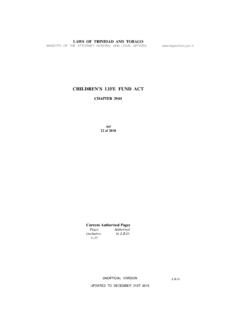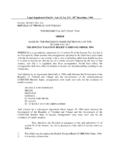Transcription of IN THE CARIBBEAN REGION - World Health Organization
1 WHO-AIMS REPORT ON MENTAL Health SYSTEMS IN THE CARIBBEAN REGION 2 WHO-AIMS REPORT ON MENTAL Health SYSTEMS IN THE CARIBBEAN REGION Report of the Assessment of the Mental Health System in the CARIBBEAN REGION (16 Countries and Territories) using the WHO-AIMS Instrument for Mental Health Systems (WHO-AIMS) 2011 M 3 TABLE OF CONTENTS ACKNOWLEDGEMENTS 4 INTRODUCTION 6 METHODOLOGY 7 THE COUNTRIES AND TERRITORIES 8 ANALYSIS OF RESULTS 10 LIMITATIONS 37 CONCLUSIONS 38 REFERENCES 40 4 Acknowledgements The number of countries involved in this sub REGION is large.
2 The completion of the WHO AIMS for each one of the countries and territories has seen the active involvement of a number of actors, working for the respective Ministries of Health as well as for PAHO/WHO country offices. In most of the cases, data on mental Health is not easily accessible; therefore it has required a long and serious commitment from those actors involved. Ministries of Health of the sub REGION have seen the importance of updating their information on mental Health , and have therefore committed to the finalization of the process. Special acknowledgment goes to the PAHO/WHO Representatives (PWR), who have supported the entire process, offering their technical advise as well as the availability of mental Health focal points within the representation to follow up the project.
3 Recognition goes also to the PWR of the Eastern CARIBBEAN Countries, who hired a technical expert to collect data in the ten countries and territories under their Representation. The following listed names are only key actors involved in the data collection process. Many professionals were consulted at one point or another. For a complete list of each country we recommend to refer to the WHO AIMS country reports (1). PAHO/WHO Representatives: Dr. Merle Lewis, The Bahamas and Turks and Caicos; Dr. Beverley Barnett, Belize; Dr. Gina Watson, Eastern CARIBBEAN Countries; Dr. Kathleen Israel, Guyana; Dr. Ernest Pate, Jamaica; Stephen Simon, Suriname; Dr.
4 Carol Boyd Scobie, Trinidad and Tobago. PAHO/WHO mental Health focal points: Mrs. Marisa Valdes, The Bahamas and Turks and Caicos; Mrs. Sandra Jones, Belize; Dr. Shirley Alleyne and Dr. Tomo Kanda, Eastern CARIBBEAN Countries; Dr. Hedwig Goede, Guyana; Dr. Jean Marie Rwangabwoba, Jamaica; Mr. Primnath Ritoe, Suriname; Mrs. Marilyn Entwistle and Dr. Guillermo Troya, Trinidad and Tobago. National professionals, main responsible person for data collection: Mrs. Yvette Holder and Dr. Patrick Prince, Bahamas and Turks and Caicos; Mrs. Jennifer Lovell and Dr. Claudina Cayetano, Belize; Mrs. Margaret Hazlewood, Eastern CARIBBEAN Countries; Dr.
5 Sonia Chehil, Guyana; Dr. Ernst Wright and Mrs. Michelle Richards Henry, Jamaica; Mr. Herman Jintie, Suriname; Mrs. Carla Ruiz and Dr. Gerald Peters, Trinidad and Tobago. The PAHO Regional Mental Health Program, Drs. Jorge Rodriguez and D vora Kestel. 5 The WHO/HQ Geneva Department of Mental Health and Substance Dependence: Drs. Shekhar Saxena, Jodi Morris and Maria Grazia Motturi. Preparation and publication of the report was undertaken with the financial support of the Government of Canada provided through the Canadian International Development Agency (CIDA). 6 Introduction The history of psychiatry and mental Health in the CARIBBEAN follows a similar path as found in other regions of the World .
6 Following the British model, psychiatric institutions more often referred to mad houses, were established in many countries and territories in the REGION between 1850 and 1900. These asylums were places where the mentally ill could be locked away from society for many years or even forever. (2, 3) With the gradual introduction of psychotherapeutic treatments and the arrival of the psychiatric pharmacotherapy, several countries and territories started developing services for the mentally ill in the community, as they sought alternative ways to treat people outside the large asylums. Many countries and territories engaged in the process of de institutionalization and development of community based mental Health services.
7 Developing services at community level initiated 30 years ago but was interrupted or slowed down for different reasons and at different time periods. As a result, there are currently mostly centralized mental Health services and less development of community based ones. It is worth saying that the countries and territories from the CARIBBEAN that have completed the WHO AIMS mostly islands and small populations present common challenges, not always considered in current literature on mental Health systems. The classic model of care moving from large mental hospitals to community care will be very different in this REGION due to their unique features (many without a mental hospital and with very limited human resources).
8 The challenge that the CARIBBEAN presents is the need perhaps of a different model that will answer to the needs of the peoples from the REGION . However, despite the complexities and difficulties of the sub REGION , there are still some positive experiences that are not always known by neighboring countries. Examples of good practices should be disseminated in the REGION . We hope this report contributes to stimulating contacts and visits in this REGION to learn about each other s experiences in comparable contexts. 7 Methodology A common issue in the CARIBBEAN is lack of epidemiological studies and general information regarding mental Health .
9 This has been partially overcome thanks to countries decision to implement the WHO AIMS. The first steps to implement WHO AIMS took place in the second half of 2006. Since then, gradually, seventeen countries and territories have assessed their mental Health systems, which sometimes was difficult. The results of those assessments are summarized in this report, except The Bahamas, whose report wasn t completed by the time of publishing this document. The whole process has culminated in November 2010. Some countries or territories presented here used data from 2009 and others utilized data from 2006. Countries and territories that began the process earlier, their systems have continued to change and these latest changes are not reflected in this document.
10 Data collection process was the same in each of the countries and territories. Once the Ministry of Health agreed to initiate the implementation, the Ministry would nominate a focal person to collect the information from all stakeholders. With the support of PAHO/WHO, country level meetings were held with key stakeholders such as mental Health professionals, Health authorities, and other partners, for presentations and discussions of the tool. The data collection process followed the workshop. Once the data was collected, PAHO/WHO professionals reviewed the information gathered. The feedbacks were sent to the focal point, whenever there was a need for clarification.

















